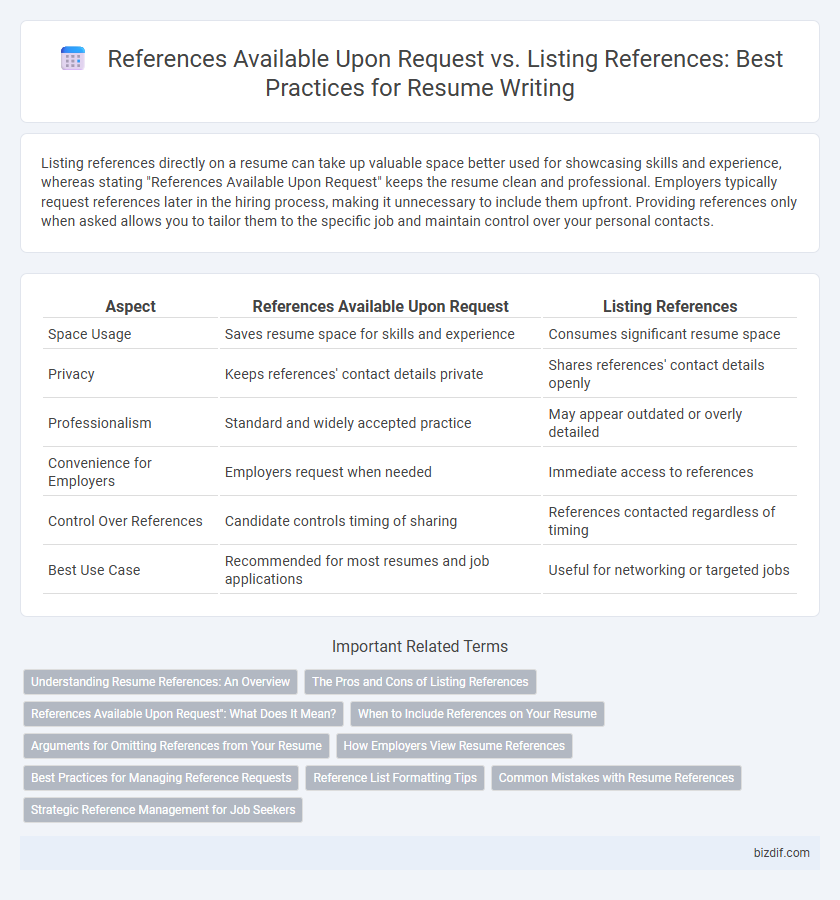Listing references directly on a resume can take up valuable space better used for showcasing skills and experience, whereas stating "References Available Upon Request" keeps the resume clean and professional. Employers typically request references later in the hiring process, making it unnecessary to include them upfront. Providing references only when asked allows you to tailor them to the specific job and maintain control over your personal contacts.
Table of Comparison
| Aspect | References Available Upon Request | Listing References |
|---|---|---|
| Space Usage | Saves resume space for skills and experience | Consumes significant resume space |
| Privacy | Keeps references' contact details private | Shares references' contact details openly |
| Professionalism | Standard and widely accepted practice | May appear outdated or overly detailed |
| Convenience for Employers | Employers request when needed | Immediate access to references |
| Control Over References | Candidate controls timing of sharing | References contacted regardless of timing |
| Best Use Case | Recommended for most resumes and job applications | Useful for networking or targeted jobs |
Understanding Resume References: An Overview
Understanding resume references is crucial for job seekers deciding whether to include them on their resumes or state "References Available Upon Request." Listing references directly on a resume provides immediate contact information for potential employers, potentially speeding up the hiring process and demonstrating transparency. Conversely, stating "References Available Upon Request" saves space and maintains privacy while signaling willingness to provide endorsements when necessary.
The Pros and Cons of Listing References
Listing references on a resume provides immediate credibility by showcasing verified professional contacts, potentially speeding up the hiring process. However, it can lead to privacy concerns for references and may consume valuable resume space better used for highlighting skills or achievements. Employers typically request references later in the hiring process, making upfront listing less necessary and sometimes exposing candidates to premature judgments.
References Available Upon Request": What Does It Mean?
References Available Upon Request" indicates that a job applicant has professional contacts willing to vouch for their skills and experience but prefers to provide these contacts only when requested by the employer. This phrase saves resume space and helps maintain the privacy of references until they are genuinely needed. Including this statement signals readiness to offer credible endorsements while keeping the resume concise and focused on core qualifications.
When to Include References on Your Resume
Including references on a resume is generally unnecessary unless explicitly requested by the employer, as it saves space for showcasing skills and experience. References become relevant in industries requiring strong professional endorsements or when the candidate has a limited work history and needs to validate their credentials. Providing "References Available Upon Request" signals readiness without cluttering the resume, allowing recruiters to request detailed contacts during later hiring stages.
Arguments for Omitting References from Your Resume
Omitting references from your resume maintains a concise and focused document, emphasizing your skills and experience rather than personal contacts. Employers typically expect references to be provided during later hiring stages, so listing them prematurely can consume valuable space better used for showcasing achievements. Protecting your references' privacy and controlling when and to whom their information is shared also supports omitting them from your initial resume submission.
How Employers View Resume References
Employers often perceive "References Available Upon Request" as a professional and concise way to indicate willingness to provide references without cluttering the resume. Listing references directly on a resume may be seen as premature or unnecessary, given that employers typically request references during later stages of the hiring process. Providing references only when requested helps maintain resume brevity and keeps the focus on qualifications and experience.
Best Practices for Managing Reference Requests
Listing references directly on a resume is less common and can lead to privacy concerns or outdated contact information; instead, keeping references available upon request allows for greater control and ensures the most relevant contacts are provided for each job application. Best practices include preparing a separate reference sheet with up-to-date contact details, notifying references in advance, and customizing the list based on the specific job. Managing references proactively demonstrates professionalism and helps maintain strong relationships while protecting both your and your references' privacy.
Reference List Formatting Tips
When deciding between "References Available Upon Request" and listing references on a resume, it is essential to prioritize clarity and professionalism in reference list formatting. Use a clean, consistent format with full names, job titles, company names, phone numbers, and email addresses, ensuring easy contact access for potential employers. Organizing references in a separate document with proper headings and uniform spacing enhances readability and maintains the resume's overall aesthetic appeal.
Common Mistakes with Resume References
Listing references directly on a resume can lead to clutter and reduce space for essential qualifications, which is a common mistake job seekers make. Including the phrase "References Available Upon Request" is preferable as it signals willingness without overwhelming the document. Providing references prematurely may also expose candidates to privacy risks and unsolicited contacts.
Strategic Reference Management for Job Seekers
Strategic reference management enhances a resume's impact by choosing when to list references or simply state "References Available Upon Request." Listing references can streamline the hiring process by providing immediate credibility and facilitating faster background checks. However, indicating availability preserves privacy, allows tailored reference selection for each job application, and keeps the resume concise and focused on core qualifications.
References Available Upon Request vs Listing References Infographic

 bizdif.com
bizdif.com